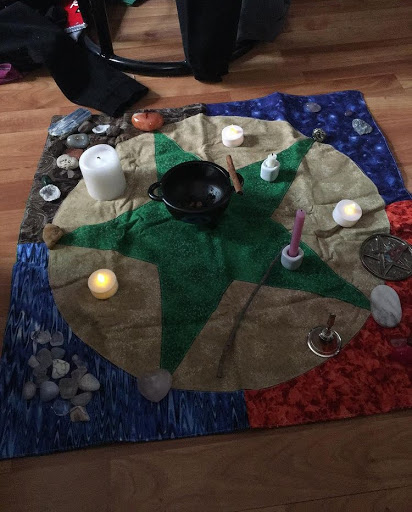Wiccan Traditions
December 10, 2020

Society itself is full to the brim with fantastic and amazing religions. Many of which, people have no idea exist. From the misunderstood aspects of VooDoo, to pacifist Jainism. One of these rarely spoken about religions is known as Wicca, or Paganism. Which, in fact, has many followers at SPASH.
Many people throughout the ages have wrongly associated Wicca with devil-worship, and with “evil” people such as witches, which is what many Wiccans call themselves. However, Wicca has absolutely nothing to do with Satan, and Wiccans do not cultivate hateful or malevolent energy into the world. Wiccans do not worship Satan, or perform any kind of sacrificial rituals which essentially is a cult . Put your assumptions away, because Wiccans are not members of a cult.
As defined by an article on ABC-Clio, Wicca is a “-worldwide nature religion with roots in the ancient past and contemporary times.” It is a religion built from ancient folkways, symbols and spiritual practices from old Pagan, Europe. It is also derived from beliefs coming from Greece, Rome, Egypt, and Mesopotamia.
As stated by another article, also on ABC-Clio, Wiccans hold specific and important virtues. These include; integrity, balance, responsibility, empathy, kindness, compassion, knowledge, and freedom. These virtues play a major role in what a Wiccan will do, and how they will act. For example, a Wiccan will respect others and the planet. They will acknowledge people’s emotions and be accommodating. Each virtue is grown and honored in each Wiccan holiday, or sabbat.
Continuing, summarized in the same article as mentioned earlier, the Wiccan spiritual calendar consists of eight sabbats, or sacred times. These include equinoxes, solstices, and midpoints in between. Some of these “holidays” are known as Samhain (October 31), or Beltane (May 1). During these sabbats, Wiccans may experience great senses of security and prosperity within themselves. During these sacred times, the rituals themselves consist of certain objects and symbols to project the meaning of the time. For example, using red candles during Yule, represents birth and new beginnings. A Wiccan may also burn holly and set out particular stones to bring more energy to the festivities.
With each occasion, brings new senses of gratitude and purpose. Each Wiccan may experience these sensations differently. During an interview with Kate Mullarkey, a practicing Wiccan, she shares her experience on Yule (December 21). She describes her experience with the celebration as a “Deep, profound joy wand connection with the cycle of the seasons, and with ancestors.” She continues, describing it as a “renewed sense of purpose, more a part of everyday life, and gratitude for the people around.”
Overall, Wicca is an extremely important aspect of many people’s lives. In fact, it’s important to around 1.5 million people according to the Pew Research Center. Wicca brings these people a sense of security, and a connection to the world around them.




































































